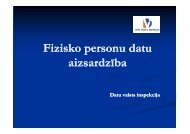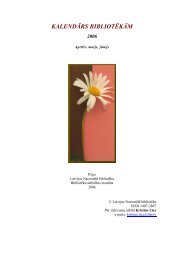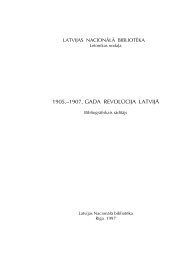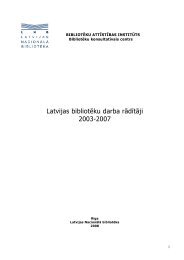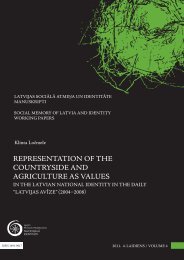- Page 2 and 3:
LAIKU ATŠALKAS: ŽURNĀLISTIKA, KI
- Page 4 and 5:
LAIKU ATŠALKAS: ŽURNĀLISTIKA, KI
- Page 7 and 8:
LAIKU ATŠALKAS: ŽURNĀLISTIKA, KI
- Page 9 and 10:
LAIKU ATŠALKAS: ŽURNĀLISTIKA, KI
- Page 11 and 12:
LAIKU ATŠALKAS: ŽURNĀLISTIKA, KI
- Page 13 and 14:
LAIKU ATŠALKAS: ŽURNĀLISTIKA, KI
- Page 15 and 16:
LAIKU ATŠALKAS: ŽURNĀLISTIKA, KI
- Page 17 and 18:
LAIKU ATŠALKAS: ŽURNĀLISTIKA, KI
- Page 19 and 20:
LAIKU ATŠALKAS: ŽURNĀLISTIKA, KI
- Page 21 and 22:
LAIKU ATŠALKAS: ŽURNĀLISTIKA, KI
- Page 23 and 24:
LAIKU ATŠALKAS: ŽURNĀLISTIKA, KI
- Page 25 and 26:
LAIKU ATŠALKAS: ŽURNĀLISTIKA, KI
- Page 27 and 28:
LAIKU ATŠALKAS: ŽURNĀLISTIKA, KI
- Page 29 and 30:
LAIKU ATŠALKAS: ŽURNĀLISTIKA, KI
- Page 31 and 32:
LAIKU ATŠALKAS: ŽURNĀLISTIKA, KI
- Page 33 and 34:
LAIKU ATŠALKAS: ŽURNĀLISTIKA, KI
- Page 36 and 37:
LAIKU ATŠALKAS: ŽURNĀLISTIKA, KI
- Page 38 and 39:
LAIKU ATŠALKAS: ŽURNĀLISTIKA, KI
- Page 40 and 41:
LAIKU ATŠALKAS: ŽURNĀLISTIKA, KI
- Page 42 and 43:
LAIKU ATŠALKAS: ŽURNĀLISTIKA, KI
- Page 44 and 45:
LAIKU ATŠALKAS: ŽURNĀLISTIKA, KI
- Page 46 and 47:
LAIKU ATŠALKAS: ŽURNĀLISTIKA, KI
- Page 48 and 49:
LAIKU ATŠALKAS: ŽURNĀLISTIKA, KI
- Page 50 and 51:
LAIKU ATŠALKAS: ŽURNĀLISTIKA, KI
- Page 52 and 53:
LAIKU ATŠALKAS: ŽURNĀLISTIKA, KI
- Page 54 and 55:
LAIKU ATŠALKAS: ŽURNĀLISTIKA, KI
- Page 56:
LAIKU ATŠALKAS: ŽURNĀLISTIKA, KI
- Page 59 and 60:
LAIKU ATŠALKAS: ŽURNĀLISTIKA, KI
- Page 61 and 62:
LAIKU ATŠALKAS: ŽURNĀLISTIKA, KI
- Page 63 and 64:
LAIKU ATŠALKAS: ŽURNĀLISTIKA, KI
- Page 65 and 66:
LAIKU ATŠALKAS: ŽURNĀLISTIKA, KI
- Page 67 and 68:
LAIKU ATŠALKAS: ŽURNĀLISTIKA, KI
- Page 69 and 70:
LAIKU ATŠALKAS: ŽURNĀLISTIKA, KI
- Page 71 and 72:
LAIKU ATŠALKAS: ŽURNĀLISTIKA, KI
- Page 73 and 74:
LAIKU ATŠALKAS: ŽURNĀLISTIKA, KI
- Page 75 and 76:
LAIKU ATŠALKAS: ŽURNĀLISTIKA, KI
- Page 77 and 78:
LAIKU ATŠALKAS: ŽURNĀLISTIKA, KI
- Page 79 and 80:
LAIKU ATŠALKAS: ŽURNĀLISTIKA, KI
- Page 81 and 82:
LAIKU ATŠALKAS: ŽURNĀLISTIKA, KI
- Page 83 and 84:
LAIKU ATŠALKAS: ŽURNĀLISTIKA, KI
- Page 85 and 86:
LAIKU ATŠALKAS: ŽURNĀLISTIKA, KI
- Page 87 and 88:
LAIKU ATŠALKAS: ŽURNĀLISTIKA, KI
- Page 89 and 90:
LAIKU ATŠALKAS: ŽURNĀLISTIKA, KI
- Page 91 and 92:
LAIKU ATŠALKAS: ŽURNĀLISTIKA, KI
- Page 93 and 94:
LAIKU ATŠALKAS: ŽURNĀLISTIKA, KI
- Page 95 and 96:
LAIKU ATŠALKAS: ŽURNĀLISTIKA, KI
- Page 97 and 98:
LAIKU ATŠALKAS: ŽURNĀLISTIKA, KI
- Page 99 and 100:
LAIKU ATŠALKAS: ŽURNĀLISTIKA, KI
- Page 101 and 102:
LAIKU ATŠALKAS: ŽURNĀLISTIKA, KI
- Page 103 and 104:
LAIKU ATŠALKAS: ŽURNĀLISTIKA, KI
- Page 105 and 106:
LAIKU ATŠALKAS: ŽURNĀLISTIKA, KI
- Page 107 and 108:
LAIKU ATŠALKAS: ŽURNĀLISTIKA, KI
- Page 109 and 110:
LAIKU ATŠALKAS: ŽURNĀLISTIKA, KI
- Page 111 and 112:
LAIKU ATŠALKAS: ŽURNĀLISTIKA, KI
- Page 113 and 114:
LAIKU ATŠALKAS: ŽURNĀLISTIKA, KI
- Page 115 and 116:
LAIKU ATŠALKAS: ŽURNĀLISTIKA, KI
- Page 117 and 118:
LAIKU ATŠALKAS: ŽURNĀLISTIKA, KI
- Page 119 and 120:
LAIKU ATŠALKAS: ŽURNĀLISTIKA, KI
- Page 121 and 122:
LAIKU ATŠALKAS: ŽURNĀLISTIKA, KI
- Page 123 and 124:
LAIKU ATŠALKAS: ŽURNĀLISTIKA, KI
- Page 125 and 126:
LAIKU ATŠALKAS: ŽURNĀLISTIKA, KI
- Page 127 and 128:
LAIKU ATŠALKAS: ŽURNĀLISTIKA, KI
- Page 129 and 130:
LAIKU ATŠALKAS: ŽURNĀLISTIKA, KI
- Page 131 and 132:
LAIKU ATŠALKAS: ŽURNĀLISTIKA, KI
- Page 133 and 134:
LAIKU ATŠALKAS: ŽURNĀLISTIKA, KI
- Page 135 and 136:
LAIKU ATŠALKAS: ŽURNĀLISTIKA, KI
- Page 137 and 138:
LAIKU ATŠALKAS: ŽURNĀLISTIKA, KI
- Page 139 and 140:
LAIKU ATŠALKAS: ŽURNĀLISTIKA, KI
- Page 141 and 142:
LAIKU ATŠALKAS: ŽURNĀLISTIKA, KI
- Page 143 and 144:
LAIKU ATŠALKAS: ŽURNĀLISTIKA, KI
- Page 145 and 146:
LAIKU ATŠALKAS: ŽURNĀLISTIKA, KI
- Page 147:
LAIKU ATŠALKAS: ŽURNĀLISTIKA, KI
- Page 150 and 151:
LAIKU ATŠALKAS: ŽURNĀLISTIKA, KI
- Page 152 and 153:
LAIKU ATŠALKAS: ŽURNĀLISTIKA, KI
- Page 154 and 155:
LAIKU ATŠALKAS: ŽURNĀLISTIKA, KI
- Page 156 and 157:
LAIKU ATŠALKAS: ŽURNĀLISTIKA, KI
- Page 158 and 159:
LAIKU ATŠALKAS: ŽURNĀLISTIKA, KI
- Page 160 and 161:
LAIKU ATŠALKAS: ŽURNĀLISTIKA, KI
- Page 162 and 163:
LAIKU ATŠALKAS: ŽURNĀLISTIKA, KI
- Page 164 and 165:
LAIKU ATŠALKAS: ŽURNĀLISTIKA, KI
- Page 166 and 167:
LAIKU ATŠALKAS: ŽURNĀLISTIKA, KI
- Page 168 and 169:
LAIKU ATŠALKAS: ŽURNĀLISTIKA, KI
- Page 170 and 171:
LAIKU ATŠALKAS: ŽURNĀLISTIKA, KI
- Page 172 and 173:
LAIKU ATŠALKAS: ŽURNĀLISTIKA, KI
- Page 174 and 175:
LAIKU ATŠALKAS: ŽURNĀLISTIKA, KI
- Page 176 and 177:
LAIKU ATŠALKAS: ŽURNĀLISTIKA, KI
- Page 178 and 179:
LAIKU ATŠALKAS: ŽURNĀLISTIKA, KI
- Page 180 and 181: LAIKU ATŠALKAS: ŽURNĀLISTIKA, KI
- Page 182 and 183: LAIKU ATŠALKAS: ŽURNĀLISTIKA, KI
- Page 184 and 185: LAIKU ATŠALKAS: ŽURNĀLISTIKA, KI
- Page 186 and 187: LAIKU ATŠALKAS: ŽURNĀLISTIKA, KI
- Page 188 and 189: LAIKU ATŠALKAS: ŽURNĀLISTIKA, KI
- Page 190 and 191: LAIKU ATŠALKAS: ŽURNĀLISTIKA, KI
- Page 192: LAIKU ATŠALKAS: ŽURNĀLISTIKA, KI
- Page 195 and 196: LAIKU ATŠALKAS: ŽURNĀLISTIKA, KI
- Page 197 and 198: LAIKU ATŠALKAS: ŽURNĀLISTIKA, KI
- Page 199 and 200: LAIKU ATŠALKAS: ŽURNĀLISTIKA, KI
- Page 202 and 203: LAIKU ATŠALKAS: ŽURNĀLISTIKA, KI
- Page 204 and 205: LAIKU ATŠALKAS: ŽURNĀLISTIKA, KI
- Page 206 and 207: LAIKU ATŠALKAS: ŽURNĀLISTIKA, KI
- Page 208 and 209: LAIKU ATŠALKAS: ŽURNĀLISTIKA, KI
- Page 210 and 211: LAIKU ATŠALKAS: ŽURNĀLISTIKA, KI
- Page 212 and 213: LAIKU ATŠALKAS: ŽURNĀLISTIKA, KI
- Page 214 and 215: LAIKU ATŠALKAS: ŽURNĀLISTIKA, KI
- Page 216 and 217: LAIKU ATŠALKAS: ŽURNĀLISTIKA, KI
- Page 218 and 219: LAIKU ATŠALKAS: ŽURNĀLISTIKA, KI
- Page 220 and 221: LAIKU ATŠALKAS: ŽURNĀLISTIKA, KI
- Page 222 and 223: LAIKU ATŠALKAS: ŽURNĀLISTIKA, KI
- Page 224 and 225: LAIKU ATŠALKAS: ŽURNĀLISTIKA, KI
- Page 226 and 227: LAIKU ATŠALKAS: ŽURNĀLISTIKA, KI
- Page 228 and 229: LAIKU ATŠALKAS: ŽURNĀLISTIKA, KI
- Page 232 and 233: LAIKU ATŠALKAS: ŽURNĀLISTIKA, KI
- Page 234 and 235: LAIKU ATŠALKAS: ŽURNĀLISTIKA, KI
- Page 236: LAIKU ATŠALKAS: ŽURNĀLISTIKA, KI






